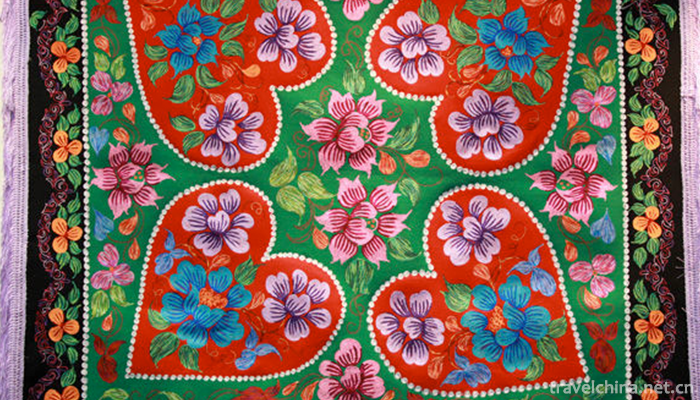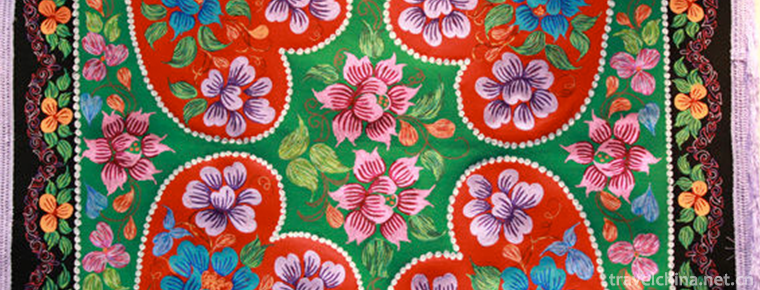Kazakh felt embroidery and cloth embroidery
Kazakh felt embroidery and cloth embroidery
Kazakh folk traditional felt embroidery and cloth embroidery handicraft are mainly spread in Xinjiang Kazakh soft residential areas, such as the Sixth Division Red Banner Farm, 107 Regiments, Qitai Farm. This technique has been approved as a national intangible cultural heritage project. Felt embroidery and cloth embroidery are the folk handicraft embroidery of Hasayi with a long history. Felt is the most representative and popular household handicraft in Kazakhstan. Every woman in Kazakhstan has her own system. Felt embroidery process is complex, patterns are numerous, labor-intensive, labor-intensive, beautiful and generous products, strong and durable, a felt can be used for more than ten years. As the saying goes, "Thousands of needles and thousands of thread embroidered felt", we can see that embroidering a felt is really not easy.
On June 7, 2008, Kazakh cloth embroidery was approved by the State Council to be included in the second batch of national intangible cultural heritage list.
Product introduction
Kazakh felts are usually analogous to animal horns, as well as cloud patterns and diamond patterns (Kazakh is called "Baoershake", because the fried Baoershake is mostly diamond, so the diamond code is "Baoershake". There are plum blossoms with four petals or six petals, eight petals and ten petals in the pattern of flower heads.
Base completion
A Kazakh felt embroidery and cloth embroidery processing and marketing base with strong national characteristics was built in the Red Flag Farm of the Sixth Division. After Kazakh felt embroidery and cloth embroidery were listed as national intangible cultural heritage projects, Red Banner Farm has done a lot of work in inheritance, protection and innovation. More than 200 Kazakh women were instructed to learn the skills of felt embroidery and cloth embroidery by the successors of the group farm mobilization. Fifteen Kazakh women were encouraged to open shop for felt embroidery and cloth embroidery and embark on the road of independent entrepreneurship. When I visited, I found that the base covers an area of 120 square meters. The production facilities of the venue include looms, sewing machines, cutting machines and so on. The embroidery works of felt embroidery made by Kazakh women are full of exhibition booths. Kazakh women uniformly produce felt embroidery and cloth embroidery works in the stadium. Special brokers and businessmen sign orders to ensure the market sales of cloth embroidery and felt embroidery products, which opens up a new way for Kazakh women to increase their income.
Protection and inheritance
Kazakh felt embroidery and cloth embroidery are the original ecological handicraft of Kazakh herdsmen. This farm provides special exhibition rooms for felt embroidery and cloth embroidery for Kazakh herdsmen, and organizes Kazakh embroidery women to study the skills of felt embroidery and cloth embroidery in northern and southern Xinjiang, thus improving the level of embroidery technology. Today, Carmen, the third generation successor, has collected more than 300 embroidery products, and some exquisite felt embroidery and cloth embroidery tapestries sell for more than 1000 yuan.


-
2.Yungang Grottoes
Yungang Grottoes is located in the southern foot of Wuzhou Mountain, 17 kilometers west of Datong City, Shanxi Province, northern China.
Time 2018-11-24 -
3.The AncientCity of Ping Yao
The AncientCity of Ping Yao is located in Pingyao County, central Shanxi Province. It was founded in Xuanwang Period of Western Zhou Dynasty (827-782 BC).
Time 2018-11-24 -
4.Mawei Shipping Museum
The Mawei Shipbuilding Cultural Heritage Group in Fuzhou is centered on the Chinese Shipbuilding Cultural Museum, including Zhongpo Battery, Zhaozhong Temple, British Consulate
Time 2019-02-06 -
5.Mingyue Gorge Scenic Area
Mingyue Gorge is located in the eastern section of Jialing Jiangxi Lingxia, Guangyuan, Sichuan Province. It covers an area of 6.1 square kilometers and is about 33 kilometers
Time 2019-02-07 -
6.Bow and Arrow Making Skills
Juyuan bow and arrow making technology, the traditional handicraft of Chaoyang District, Beijing, is one of the national intangible cultural heritage.
Time 2019-05-01 -
7.The Mausoleum of the Yellow Emperor
The Mausoleum of the Yellow Emperor is one of the national intangible cultural heritages, which has formed a certain scale format and sacrificial ceremonies in the long-term practice.
Time 2019-05-04 -
8.Glass Firing Techniques
Glass firing technology, Beijing Mentougou District, Shanxi Province, local traditional handicraft, one of the national intangible cultural heritage.
Time 2019-05-14 -
9.Construction Techniques of Traditional Residential Buildings in Southern Fujian
South Fujian residential building technology is a unique traditional architectural technology originating in Quanzhou, which began in Tang and Five Dynasties, is the mainstream of ancient architectura
Time 2019-06-05 -
10.Sanxianshu
Sanxianshu, also known as Qianzi Shu and Leg Blackboard Shu, is an ancient traditional rap art formed in Nanyang, Henan Province. It has a history of more than 250 years. It is named for its main acco
Time 2019-06-12 -
11.Tujia Year
Tujia Year is an important and ancient festival of Tujia people in Xiangxi Tujia and Miao Autonomous Prefecture of Hunan Province. During the thousands of years of historical development, some relativ
Time 2019-06-23 -
12.Anhui University Of Technology
Anhui University of Technology is located in Anhui province. Ma'anshan The city is a multi-disciplinary university characterized by industry and industry. Ministry of science and technology With the s
Time 2019-10-10